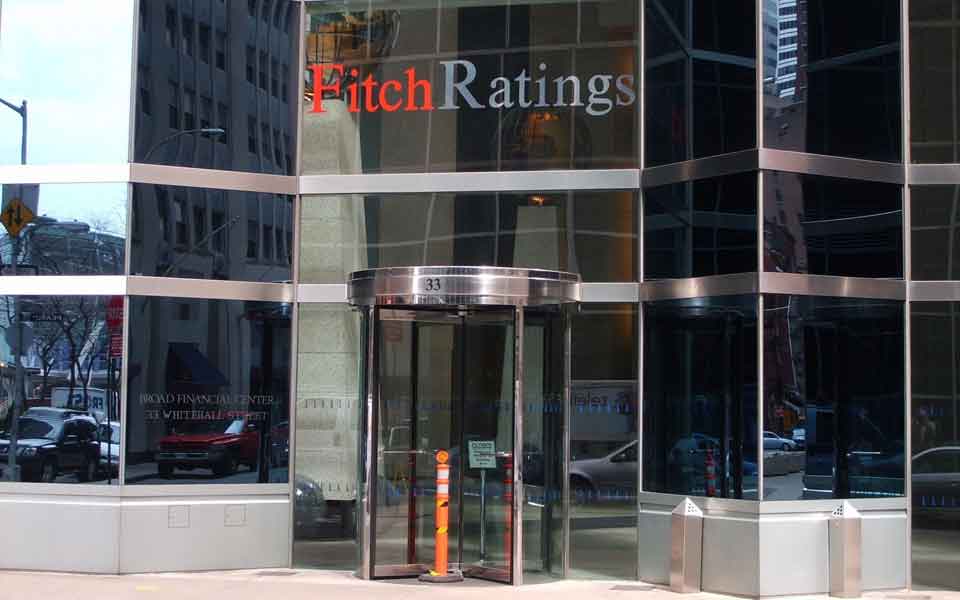Market confidence will be essential for Greece, say Fitch officials

The main issue for Greece is the return of investment confidence in it, and this year’s election will be very important toward that, say Michele Napolitano, Fitch's Head of Western Europe Sovereigns and Cristina Torella, Senior Director for Financial Institutions at Fitch Ratings in interviews with Kathimerini.
Mr Napolitano, Fitch rates Greece with «BB-» with stable outlook. What are the developments that could lead to an upgrade of the outlook or/and the rating?
We identified a number of positive ratings sensitivities in our last rating review in August last year: positive developments in three areas could lead to a positive rating action. One is on the macro side; greater confidence that the economic recovery is entrenched.
Τhe second area is fiscal developments; track record of achieving further primary surpluses and evidence that even in a post-program world Greece is going to maintain discipline in the fiscal policies and not going back to significant fiscal loosening. Βasically we would not like to see a reversal of policies that have been implemented and of past structural reforms and also we would like to see fiscal policy to remain fairly disciplined.
The third area is banking sector developments. Evidence that nonperforming exposures are declining would be positive for the rating and in this respect we are quite keen to see the details of the nonperforming loan reduction plans. We are aware of the plans that have been put forward by the Hellenic Financial Stability Fund and the Bank of Greece to accelerate the reduction of NPEs, but we don’t know exactly which plan will be adopted by the government. When we have details on those plans we will have to factor them in to our analysis. Once we have more information about the fiscal implications of the plans and if we are satisfied that the plans would lead to an acceleration to the reduction of NPEs, this could be a trigger for a positive rating action.
Although Greece completed its third economic adjustment program five months ago, its ability to attract foreign investment to finance growth remains weak. Do you think Greece needs an investment shock?
I am not sure Greece needs an investment shock. The key thing is confidence. Greece has a track record of political volatility – and political volatility which has led to reversals of policies – and this has made investors very cautious. Investment has come down quite a lot since pre-crisis; even a partial restoration of confidence could actually lead to quite a sharp rebound in investment. We think the elections this year will be quite important. If the elections, no matter the result, do not result in a sharp reversal of previous policies and if there is policy continuity after the elections that could be a game changer. This could be something that makes the investors understand that Greece is a country that can maintain discipline in economic and fiscal policies over time even outside the program.
Greece has a large cash buffer, but the more a state comes to the market the better, as it helps build investors’ trust. Do market conditions appear now favorable (Italy pressure has receded) for Greece to issue a new bond?
It is up to the Public Debt Management Agency to judge how favorable the market conditions are for the sovereign. From our perspective I would note the following. The first thing is that the Greek state does not really need to go to the market. It has a large cash buffer and it has very low financing needs: therefore the PDMA has the luxury to wait for the right moment in order to achieve a good pricing. At the lower end of the curve (five years) the yields currently look more favorable than over the 10-year horizon. The main reason why the PDMA wants to tap the markets, in our view, is to give a signal to investors that Greece is able to tap the primary market when it wants and that could increase the confidence of investors in the debt management strategy of the government.
Does the current political environment plus the fact that 2019 is an election year, pose risks of delays in areas such as privatization, improvements in the business environment or the approach toward the reduction of nonperforming in the banking sector?
Our assumption is that the political backdrop in Greece is more stable and the electoral outcome will not lead to significant delays in the areas you mentioned. We expect broad policy continuity in the areas of privatization, fiscal management, NPE reduction. This is our assumption and it is an important one that underpins our rating. If that was not to be the case then we would need to revise our rating assumptions but from what we see, from the political debate and the polls we do not expect significant reversal of policies.
In your view, could the execution of the 2019 budget be negatively affected by pending court rulings on a past government decision on public sector wages, as well as on the 2012, 2015, and 2016 pension system reforms?
Let’s wait for the rulings. In past rulings the Greek government has managed to meet the fiscal targets. In the past it has used the fiscal space by reducing the level of money allocated to public investment. We will have to discuss with the Greek authorities what is their Plan B if those rulings pass, what would be the fiscal cost involved and how the government intends to address that. From a rating perspective we expect Greece to run very sizable primary surpluses in 2019, our projection is for a primary surplus of 3.5 percent of GDP. Even if this primary surplus was lowered (i.e. if the court rulings were to result in moderately higher deficits) it would not be necessarily negative for the sovereign rating. Even quite a substantial reduction in the primary surplus would still result in the path of public debt to remain in a downward trajectory. And this is what matters in our sovereign rating assessment.
Ms Torrella, Fitch rates Greece with ‘BB-‘ with stable outlook, but its ratings of Greek Banks are much lower and at the CCC range. Why is there such a big difference? Why do banks’ ratings remain so constrained?
Greek banks’ ratings remain constrained by exceptionally weak asset quality and high capital encumbrance by unreserved problem assets. The latter ratio remains very high for all banks, well above 100 percent for most banks, making Greek banks’ capital vulnerable to adverse moves on valuation and volumes of problem assets. Ratings also reflect improving but still scarce liquidity and weak profitability. The large stock of problem assets is dragging banks’ profitability prospects in our view. So, to your question, the two most sensitive rating factors of Greek banks’ CCC rating level are asset quality and capital.
What are the key challenges Greek banks are facing?
The key challenge is to address the large stock of problem assets. But this needs to be done in a substantial manner. The volume, the speed and the impact on the banks’ capital of the reduction will be important in our assessment of bank ratings, but also to restore lending and full confidence in the banking sector.
Are the BoG’s proposal and HFSF’s scheme for the reduction of NPE’s credit positive? Are these enough to remove uncertainty over the sector which has lead to a huge sell-off in their stocks in the Athens Stock Market?
The establishment of large-scale NPE reduction schemes currently under debate by Greek authorities is something we have not incorporated in our ratings. Should these go ahead, which are not free from execution risks – will be a game changer for the sector to the extent that they entail a sizable portion of NPEs being offloaded from banks’ balance sheets, assuming banks make extensive use of these schemes. This in our view will help accelerate the sectors’ asset quality clean-up, bring stability and restore full confidence in the sector, allowing banks to focus on business growth and ultimately support the Greek economy. That said, we see material execution risks and there are still unknown details of the schemes to be able to assess the impact on banks’ overall standalone credit profile. If implemented, we don’t expect to be visible in 2019 but more in the medium-term.
When, in your view, will the asset quality improvement and the repair of their balance sheets, start to be visible?
There have been moderate results in relation to asset quality improvement in 2018 helped by a supportive macroeconomic environment and positive reforms in the insolvency framework, resulting in a reduction of NPE inflows. In addition, toward the second part of 2018, NPE portfolio sales favored by increased appetite by institutional investors to buy Greek distressed assets and the introduction of legal tools to address bad loans helped in the work-out of NPEs. However, as I said earlier, unless there is a systemic solution to address the sectors’ large stock of problem assets, material asset quality improvements will take time. We expect the reduction of problem assets to continue in the next three years, also bearing in mind banks’ NPE targets, largely driven by lower NPE inflows but most importantly NPE portfolio sales. The latter will largely depend on the continued stability of the Greek operating environment, the evolution of real estate sector and investors’ appetite toward Greek distressed assets.





